21:39 PM
19:48 PM
14:23 PM
09:58 AM
19:43 PM
13:58 PM
18:56 PM
12:56 PM
10:00 AM
09:11 AM
20:54 PM
19:15 PM
17:32 PM
16:57 PM
10:14 AM
21:53 PM
13:59 PM
18:42 PM
13:25 PM
12:41 PM
10:01 AM
09:40 AM
22:23 PM
20:50 PM
19:13 PM
16:35 PM
09:25 AM
20:57 PM
20:34 PM
18:31 PM
18:15 PM
17:09 PM
19:22 PM
22:55 PM
20:51 PM
18:42 PM
22:54 PM
19:34 PM
18:01 PM
23:39 PM
23:39 PM
20:59 PM
20:20 PM
18:14 PM
09:25 AM
19:29 PM
18:31 PM
18:15 PM

In Pakistan, devastating flash floods triggered by monsoon rains have caused multiple deaths and left many missing, while also inflicting large-scale destruction.
The European Union has announced emergency aid of Rs. 350 million for the flood victims.
According to the EU, the Rs. 350 million assistance is aimed at addressing the immediate needs of those affected by the floods.
In Pakistan, devastating flash floods triggered by monsoon rains have caused multiple deaths and left many missing, while also inflicting large-scale destruction.
The EU expressed deep sympathy with the families of the deceased and the affected communities, stating that the aid would be delivered through trusted humanitarian organizations.
According to the EU, the assistance will include life-saving health services, cash support for the most vulnerable and severely affected people, and reiterated that the EU stands with the people of Pakistan in this difficult time.
Read more: Punjab floods affect over 1.6 mln, death toll rises to 37
Meanwhile, Deputy Prime Minister Ishaq Dar received a phone call from the Vice President of the European Union, who expressed condolences over the loss of lives in the recent floods.
According to the Foreign Office spokesperson, the EU Vice President conveyed solidarity with the victims and their families and assured Pakistan of cooperation in relief and rehabilitation efforts.
The spokesperson added that the Deputy Prime Minister thanked the EU for its solidarity and support, noting that Pakistan is among the countries most severely affected by the climate crisis.

The directives were revealed by Barrister Gohar.
Pakistan Tehreek-e-Insaf (PTI) Chairman, Barrister Gohar Ali Khan, announced that party founder and former Prime Minister Imran Khan has directed all PTI leaders and workers to fully support flood victims across Pakistan, in the wake of the recent devastating floods.
Speaking to the media after a brief 15-20 minute meeting with Imran Khan at Adiala Jail, Barrister Gohar shared that during the meeting, the former prime minister expressed his deep grief and sympathy for the families affected by the floods. Imran Khan also conveyed his solidarity with the victims and their families across the country.
Barrister Gohar also briefed Imran Khan about the resignations submitted by PTI members from the Public Accounts Committees (PAC) and the symbolic session conducted outside Parliament earlier in the day.
Imran Khan reaffirmed his support for the move, underlining that PTI lawmakers will continue to resign from parliamentary standing committees as part of their protest against political injustices.
The former premier made it clear that PTI’s stance is to remain outside these committees.
Regarding political matters, Barrister Gohar provided an update on the preparations for a major political rally scheduled in Khyber Pakhtunkhwa, despite the setbacks caused by the floods.
Read more: Punjab floods affect over 1.6 mln, death toll rises to 37
Though flood-related challenges had delayed the event's preparations, Barrister Gohar confirmed that the planning for the rally was actively progressing.
On the international front, Imran Khan also expressed deep sorrow over the recent earthquake in Afghanistan’s Kunar province, which resulted in significant loss of life.
He described the tragedy as heartbreaking and expressed solidarity with the Afghan people during their time of suffering.
Despite his incarceration, Imran Khan continues to guide PTI’s political direction and relief efforts, issuing clear instructions on both the flood response and the party’s parliamentary strategy.
Barrister Gohar reiterated that the former prime minister remains fully committed to supporting the people of Pakistan and shaping the party’s future path.

Relief activities are underway at full pace.
Punjab continues to reel under the impact of devastating floods, with the number of affected people surpassing 1.6 million, while the death toll across the province has risen to 37.
The Ravi River, carrying a flood surge of over 200,000 cusecs, wreaked havoc in Tandlianwala before entering the limits of Kamalia, submerging dozens of villages, farmlands, and connecting roads.
In Multan, several settlements near the Chenab River have gone underwater. Displaced families were seen evacuating on boats, carrying their valuables and savings as they fled to safer ground.
However, the situation in relief camps has worsened, with outbreaks of infectious diseases reported.
Children in particular are suffering from skin infections and other serious illnesses in camps established across the district.
Floodwaters have also ravaged Muzaffargarh, where 14 villages of Rangpur were submerged. Meanwhile, in Jhang, as many as 250 villages have been inundated.
Hundreds of fish farms from Head Trimmu to Head Punjab were washed away by the surging waters.
Authorities have termed the next 24 hours critical, warning that around 800,000 cusecs of water will pass through Multan tonight.
Commissioner Multan confirmed that more than 400,000 people have already been shifted to safe locations.
The Punjab government has intensified relief operations, but the sheer scale of the disaster continues to threaten lives, agriculture, and infrastructure across the province.
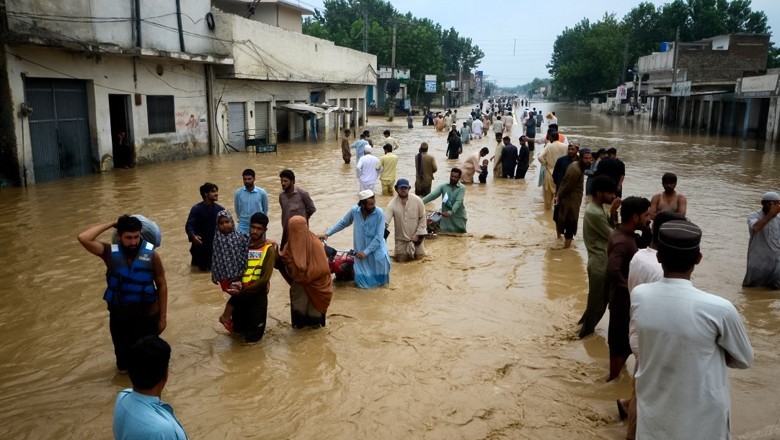
Authorities warn that nearly one million cusecs could converge at Panjnad between Sept 4 and 5
The water level in Punjab’s rivers is expected to rise further after the High Commission of India informed Pakistan of more floodwater from the Harike and Ferozepur headworks, according to the Pakistan Commission for Indus Water.
According to an advisory issued by the Provincial Disaster Management Authority (PDMA), “Harike and Ferozepur along the Sutlej in India are at high flood level as of 8am on Sept 1, which will affect the water levels in the respective downstream districts.”
Northern India has witnessed continuous heavy rainfall in recent weeks, particularly in river catchments that flow into Pakistan. Indian forecasts warn the next 36 hours will be critical in Uttarakhand, Himachal Pradesh, Haryana and Punjab due to the likelihood of more heavy showers.
In Pakistan, river flows remain dangerously high. As of early Tuesday morning, the Chenab at Trimmu recorded an outflow of 532,498 cusecs — categorised as a “very high” flood — with water levels expected to approach 700,000 cusecs in the coming days.
Also Read: Sindh Flood Monitoring cell issues latest river and barrage water flow data
The Ravi River is also surging, with Balloki Headworks registering 144,675 cusecs and Sidhnai Headworks 105,604 cusecs, both rising steadily. Meanwhile, the Sutlej poses a severe threat at Ganda Singh Wala, where an “exceptionally high” flood continues with outflows of 253,068 cusecs. Authorities warn that nearly one million cusecs could converge at Panjnad between Sept 4 and 5.
The Punjab government, describing the situation as its “largest rescue and relief operation,” has shifted focus to the southern districts.
“The water has passed the major central Punjab population centres, but the true test of our infrastructure and preparedness is now at Panjnad and the areas beyond," a senior government officials said, as quoted by an English daily. "We are monitoring it on a minute-by-minute basis.”

Punjab CM is supevising relief activities.
Maryam Nawaz made sure every flood relief food box had her face on it. Imagine losing your home, your crops, your children’s clothes to the water then opening a box of daal just to be reminded who’s drowning you in narcissism. https://t.co/6yKxn8PZFt
— Suhaib (@SuhaibAyaz) August 31, 2025
The distribution of ration boxes to flood-hit victims has triggered controversy after images surfaced showing the boxes printed with Punjab Chief Minister Maryam Nawaz Sharif’s picture.
The move drew criticism from civil society and opposition parties, who argued that relief goods meant for disaster-hit families should not be politicized or used for personal publicity.
Social media users also expressed outrage, calling the practice “exploitative” at a time when thousands of people are struggling due to flooding.
Officials, however, defended the initiative, saying the government is working round-the-clock to ensure food and aid supplies reach affected communities.
Earlier, Punjab Chief Minister Maryam Nawaz visited a flood relief camp near Tarimun Barrage. She inspected the sports complex camp and checked medicine and doctor availability at the field hospital.
The administration briefed her on ongoing relief efforts. She also interacted warmly with women and children at the camp.
Maryam Nawaz addressed false propaganda claiming she ordered saving factories over people. She denied these rumors firmly. She said, “If I had a factory, I would still say save the population first.”
Her sole focus remains saving human lives and providing help where needed.
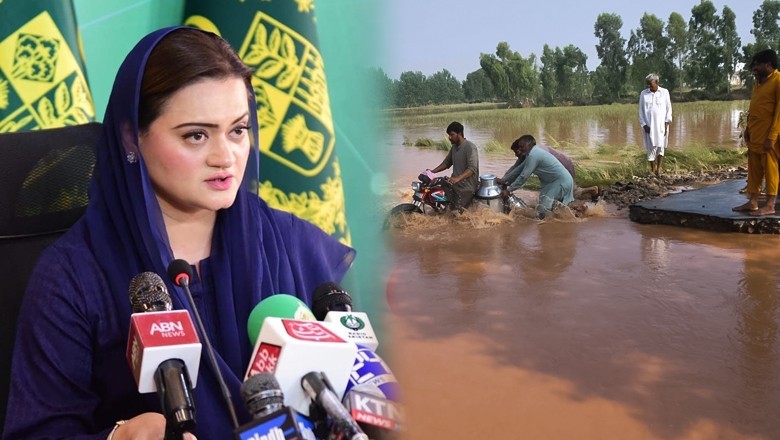
Over 600,000 have been rescued so far as per Punjab govt.
Punjab’s Senior Minister Marriyum Aurangzeb has said that the provincial government is taking all possible steps to deal with the ongoing flood crisis.
In a statement, she said that all institutions are on high alert and actively engaged in field operations.
Currently, 11 districts of Punjab are under flood threat, and residents from vulnerable areas have been shifted to safe locations.
She described the “super flood” in the rivers Chenab, Jhelum, and Ravi as an unprecedented event in Punjab’s history.
The affected districts include Jhang, Sahiwal, Toba Tek Singh, Okara, Multan, Pakpattan, Bahawalnagar, Vehari, and Bahawalpur.
Marriyum Aurangzeb added that extremely high flood levels have been recorded at Trimmu, Balloki, and Sulemanki, while Ganda Singh Wala is facing an unusually intense flood situation.
High flood levels have also been observed at Sudhnal and Abdul Hakim, whereas medium-level floods are being reported at Khanki, Qadirabad, and Shahdara.
Appealing to the public, she urged full cooperation with the administration, assuring that all institutions are working round the clock to serve the people.
She added that flood-hit areas are being monitored through drones and thermal technology.
Read more: India releases more water into Pakistan rivers without notice
According to official figures shared by the minister, the floods have so far claimed 35 lives in Punjab, affecting more than 2.33 million people.
Over 857,000 people have been relocated to safe areas, while 2,222 villages have been impacted.
Relief efforts are underway, with 383 relief camps and 375 medical camps in operation. Additionally, 551,769 livestock have been moved to safer areas, with 329 veterinary medical centers providing treatment for animals.
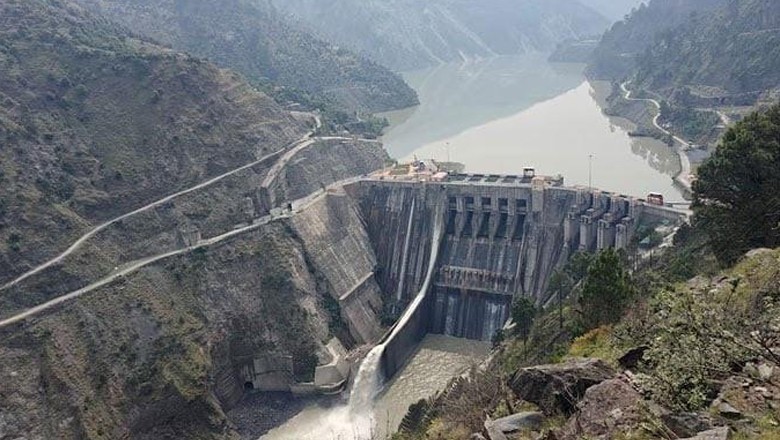
According to PDMA sources, India has once again released water from three key points without informing Pakistan, heightening the risk of flooding across Punjab.
India's continued water aggression has intensified, as it released additional water into rivers from the Salal Dam, Nangal Dam, and Harike Barrage without prior notice.
The released water is expected to flow into the Chenab and Sutlej rivers, raising concerns of worsening flood conditions at Ganda Singh Wala and surrounding areas in Pakistan.
According to PDMA sources, India has once again released water from three key points without informing Pakistan, heightening the risk of flooding across Punjab.
The Provincial Disaster Management Authority (PDMA) confirmed that further water discharge from Salal Dam, Nangal Dam, and Harike Barrage is underway. As a result, a significant surge is expected in the Chenab River downstream of the Salal Dam.
PDMA reported that official sources had issued a high-flood warning today at Harike on the Sutlej River, but no formal notifications were given for water releases from other points.
Sources added that India has opened the spillways of Nangal Dam — located about 15 kilometers from Bhakra Dam on the Sutlej — releasing a substantial volume of water.
Flow from the Harike Barrage has also increased, prompting India to issue a high-flood alert at the location.
Reports indicate that up to 350,000 cusecs of water could be released from Nangal Dam, potentially worsening flood conditions at Ganda Singh Wala.
PDMA stated that no formal warning has been received from India regarding water release into the Chenab or other rivers, nor any official communication about the opening of Salal Dam's spillways.
According to the DG PDMA, on the instructions of Punjab Chief Minister, district administrations and relevant agencies are on high alert.
PDMA, IRSA, and the irrigation department are closely monitoring the situation and will issue timely alerts to both the administration and the public in case of any potential water surges.
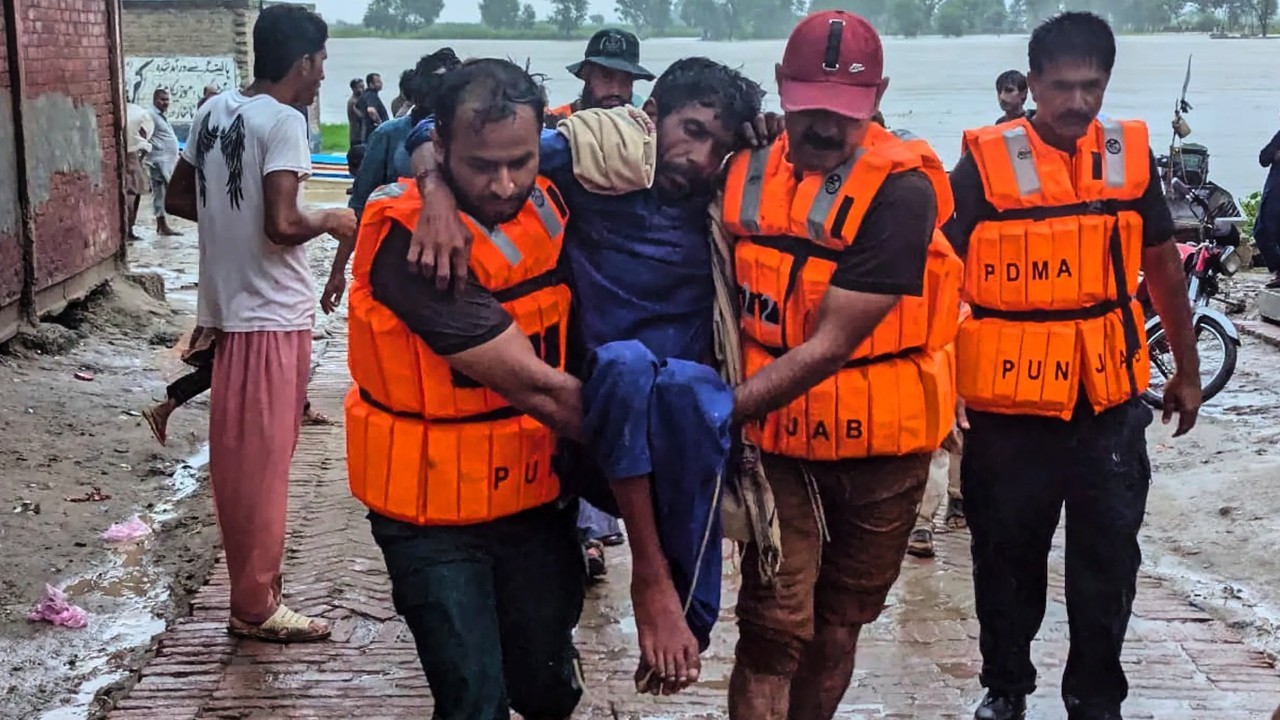
Rescue operations are underway.
Punjab is reeling under torrential rains and historic flooding, which have so far claimed at least 33 lives, submerged more than 2,200 villages, and forced the evacuation of over 700,000 residents, according to provincial disaster management authorities.
Director General of the Provincial Disaster Management Authority (PDMA) Punjab, Irfan Ali Kathia, said the province is experiencing one of the largest floods in its history, with all three major rivers inundated.
Kathia confirmed that while water levels in the Sutlej near Kasur have begun to recede, a flow of nearly 135,000 cusecs is expected to reach Pakpattan, Bahawalnagar, and Vehari by tomorrow.
Meanwhile, floodwaters are already coursing through Bahawalnagar and Bahawalpur, displacing villagers en masse.
At Treemoon Barrage, water discharge surged dramatically to 361,633 cusecs, a rise of more than 100,000 cusecs in a short span, intensifying fears of further inundation.
Officials are considering controlled breaches of embankments to manage water pressure and mitigate the damage.
Read more: Mother dies trying to save son during flood in Wazirabad
According to PDMA estimates, nearly 2 million people in Punjab have been affected, with relief and rehabilitation operations continuing in the worst-hit districts.
Alongside the relocation of communities, thousands of livestock have been shifted to safer areas to minimize losses.
Authorities say the ninth spell of the monsoon has aggravated the crisis, with widespread destruction reported across multiple districts.
Rescue teams, backed by local and provincial administrations, are working round-the-clock to provide relief, but officials warn that the situation remains precarious.

Qadri urged foe unity in this difficult time.
Lahore: Dr. Tahirul Qadri, Patron-in-Chief of Minhaj-ul-Quran, has announced that this year the funds allocated for the annual Global Milad Conference will instead be spent on the relief and rehabilitation of flood-affected people across Pakistan.
In a statement shared on social media, Dr. Qadri highlighted that large parts of the country have been devastated by floods, leaving millions of people in distress.
He stressed that this is not a time for criticism or politics but rather a time for unity and collective efforts to support those suffering.
Dr. Qadri noted that humanity in Pakistan is mourning and under severe hardship due to widespread destruction.
Read more: Mother dies trying to save son during flood in Wazirabad
“We have therefore decided that the millions of rupees usually spent on organizing the Global Milad Conference will this year be redirected toward flood relief and assistance,” he said.
He further added that, instead of being held at Minar-e-Pakistan, the Global Milad Conference will take place at Aiwan-e-Iqbal, Lahore, this year in light of the prevailing situation.

Pakistan is facing massive flooding.
Wazirabad: A heartbreaking tragedy struck Wazirabad’s Sohdra area when a mother lost her life while attempting to save her son from the raging floodwaters of the Chenab River.
According to local reports, the powerful flood currents left a trail of destruction across the region.
In one such incident, a young boy slipped and fell into the torrent. Without hesitation, his mother jumped into the flood to rescue him.
Though she managed to reach her son, the deep waters overpowered her, leading to her tragic drowning.
The grieving children were left devastated as they witnessed the loss of their mother.
Floods displace over 1.4 million people in Punjab, meteorologists predict more downpour
Recalling the moment, the son tearfully said he had slipped into the water, and his mother rushed in to save him but could not keep herself afloat.
The tragic sacrifice has left the entire community mourning, highlighting once again the devastating toll of the floods in Punjab.
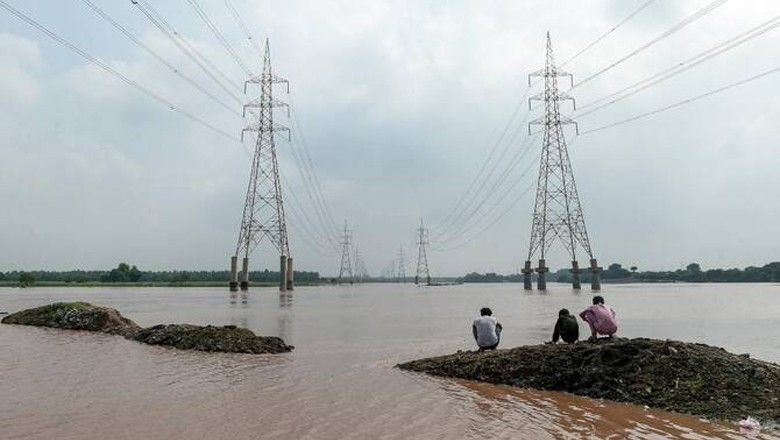
The minister further stated that if additional relief is announced for flood victims, the DISCOs will waive applicable charges.
The federal government has announced relief measures for electricity consumers in flood-hit areas of Punjab and across Pakistan, easing the financial burden on affected residents.
During a meeting at the LESCO headquarters in Lahore, Federal Minister for Energy Awais Leghari revealed that consumers in flood-affected regions will receive special relief, including extended deadlines for bill payments.
The minister further stated that if additional relief is announced for flood victims, the distribution companies (DISCOs) will waive applicable charges.
Leghari acknowledged that floodwaters have hindered the restoration of power in some areas but assured that electricity supply would be fully restored as soon as water levels recede.
Highlighting the ongoing support to the people, the minister shared that, out of 33 million electricity consumers in Pakistan, 18 million are currently benefiting from a 70% discount on their bills.
Additionally, LESCO employees have made a donation of one day’s salary to the Prime Minister’s Flood Relief Fund, underscoring their commitment to the cause. Leghari emphasized that the safety of both consumers and workers would remain a top priority.
He also pointed out the increasing number of consumers who have turned to solar energy, noting that many have installed solar panels, reducing their consumption to below 200 units, and thereby lowering their bills.
Read more: 52,000 families at risk of displacement due to flood in Sindh, Murad Ali Shah told
Leghari attributed effective government actions to a visible reduction in power tariffs, stating that those who fail to recognize this reduction are simply “blindfolded.”
The minister also discussed the ongoing crackdown on electricity theft in Punjab, revealing that over 41,000 people have been arrested as part of the operation.
On the subject of power production, Leghari mentioned the installation of new Independent Power Producers (IPPs) with net metering. While the system has added Rs4 per unit to electricity costs, he stressed that the government must address this burden responsibly.
Leghari also updated on the privatization process of WAPDA, highlighting that it is moving forward, alongside a rightsizing initiative within the department. He made it clear that the current government has refrained from political hiring, focusing instead on empowering the companies.
In a move aimed at further reducing costs, the National Electric Power Regulatory Authority (NEPRA) recently slashed the power tariff by Rs1.89 per unit, offering additional relief to consumers nationwide.
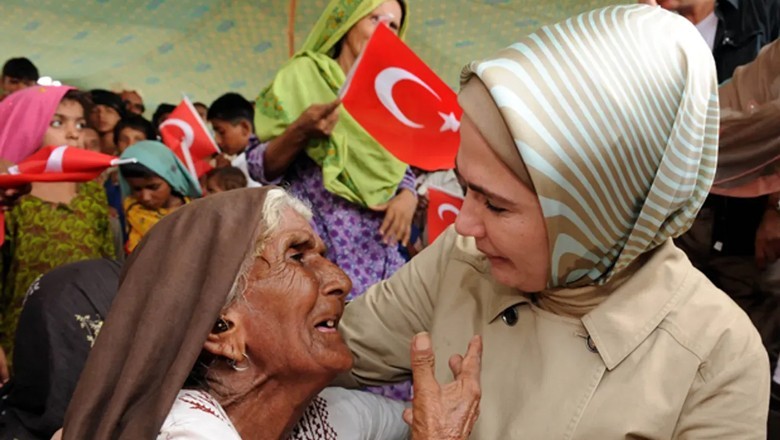
She also prayed for the forgiveness of those who lost their lives in the floods and for the swift recovery of the injured.
2010 yılındaki sel felaketinde Pakistan’a gitmiş, oradaki gözyaşına ve çaresizliğe yakından şahit olmuş biri olarak, yeniden aynı acıyla sınanan kardeşlerimize geçmiş olsun dileklerimi iletiyorum.
— Emine Erdoğan (@EmineErdogan) August 29, 2025
O zaman da Türkiye, Pakistan’ın yaralarını sarmak için elini ilk uzatan… pic.twitter.com/45D7Ov9zZW
Turkish First Lady Emine Erdoğan has shared an emotional message on social media, expressing deep sympathy for Pakistan amid its devastating flood crisis.
In a post on X (formerly Twitter), she recalled her visit to Pakistan during the 2010 floods, where she witnessed firsthand the suffering and helplessness of the victims.
She noted that Turkey was among the first countries to extend assistance at that time, and reaffirmed that today, too, the hearts, prayers, and aid of the Turkish people remain with Pakistan.
Emine Erdoğan said the Turkish Red Crescent is closely monitoring the situation in affected areas and is ensuring the provision of urgent healthcare, shelter, food, and clean water.
Read more: Death toll in Punjab floods rises to 30, over 1.5mln displaced
She also prayed for the forgiveness of those who lost their lives in the floods and for the swift recovery of the injured.
Furthermore, she urged the international community to step forward and support Pakistan in this time of crisis, emphasizing the need for compassion and solidarity to help heal the wounds of the victims.
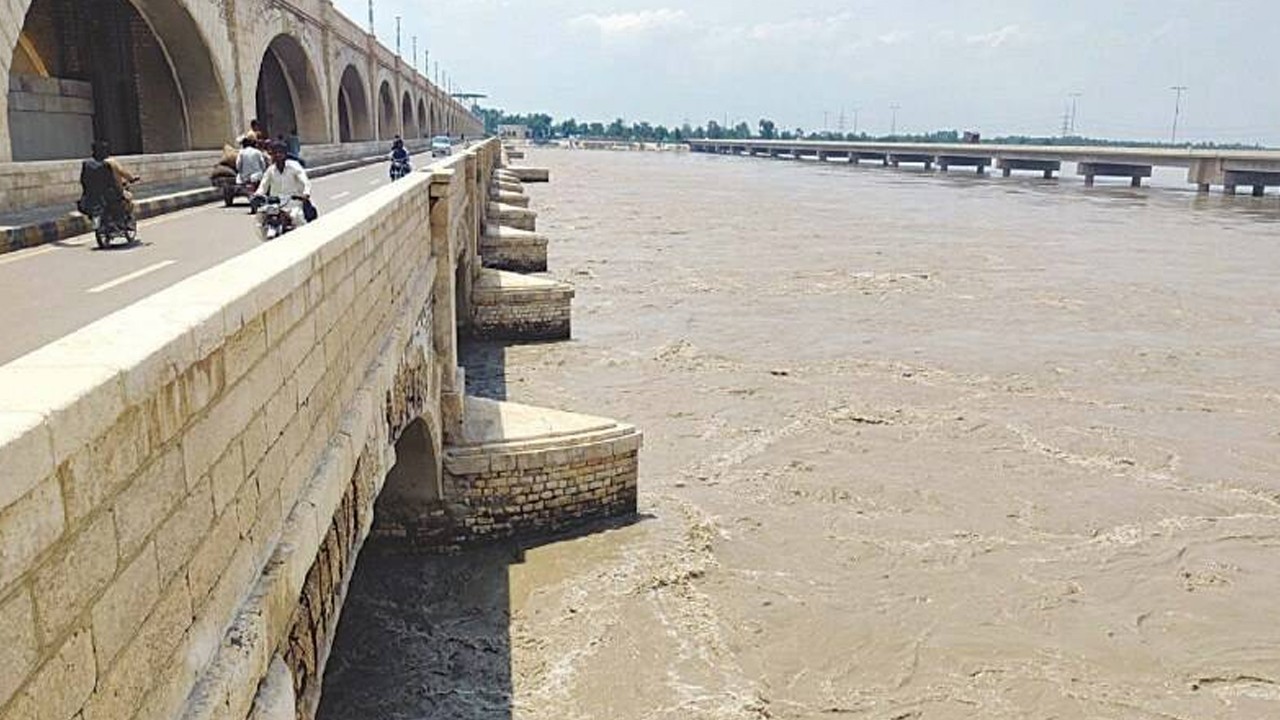
Water flow at Guddu Barrage was recorded at 383,299 cusecs upstream and 350,943 cusecs downstream at 12 noon today
Sindh Chief Minister Syed Murad Ali Shah on Saturday warned of possible flood in the Indus River on Tuesday and Wednesday night and directed provincial ministers and departments to remain on high alert.
The chief minister contacted ministers appointed to oversee the flood situation and instructed them to ensure strict monitoring of the canal system along both the right and left embankments of the river.
Shah was briefed on the river’s state by Sindh Irrigation Minister Jam Khan Shoro. According to the latest figures shared with him, water flow at Guddu Barrage was recorded at 383,299 cusecs upstream and 350,943 cusecs downstream at 12 noon today.
At Sukkur Barrage, the upstream flow stood at 313,000 cusecs and downstream at 259,050 cusecs, while Kotri Barrage recorded 264,131 cusecs upstream and 233,216 cusecs downstream.
Also Read: Death toll in Punjab floods rises to 30, over 1.5mln displaced
Officials told the chief minister that the situation at the barrages was so far stable and all precautionary measures had been taken. Shah, however, directed all relevant departments and district administrations to remain fully active in the field.
He asked provincial ministers to personally supervise precautionary measures and assured that the Sindh government was prioritising the safety of people and their property. “Our ministers are present at the river sites to monitor the barrages and embankments,” he said.
The chief minister also urged residents living along riverbanks or in kutcha (riverine) areas to cooperate with the administration in order to ensure their safety.

According to her statement, floodwaters from three major rivers have impacted 2,038 villages across the province.
Senior Provincial Minister Marriyum Aurangzeb has said that recent floods in Punjab have claimed 30 lives and affected more than 1.5 million people, though timely precautionary measures helped the province avert a much larger human tragedy.
According to her statement, floodwaters from three major rivers have impacted 2,038 villages across the province.
She noted that Punjab’s Chief Minister is directly supervising the grand rescue operation, with all institutions working together to support the affected population.
Aurangzeb highlighted that, more than 481,000 people have been shifted to safe locations.
511 relief camps and 351 medical camps are operating round the clock, currently sheltering 6,373 individuals.
Read more: Park View City: From development to flooding and controversies
Over 405,000 livestock have been moved to secure areas, supported by 321 veterinary camps.
The number of boats deployed for rescue operations has increased to 808.
Marriyum Aurangzeb further stated that climate change has now taken the shape of devastation, adding that once recovery is complete, an anti-encroachment drive will be launched, and state-of-the-art early warning systems will be introduced in Punjab.
She asserted that, in light of recent experiences, a comprehensive strategy will be devised to minimize losses in the future.
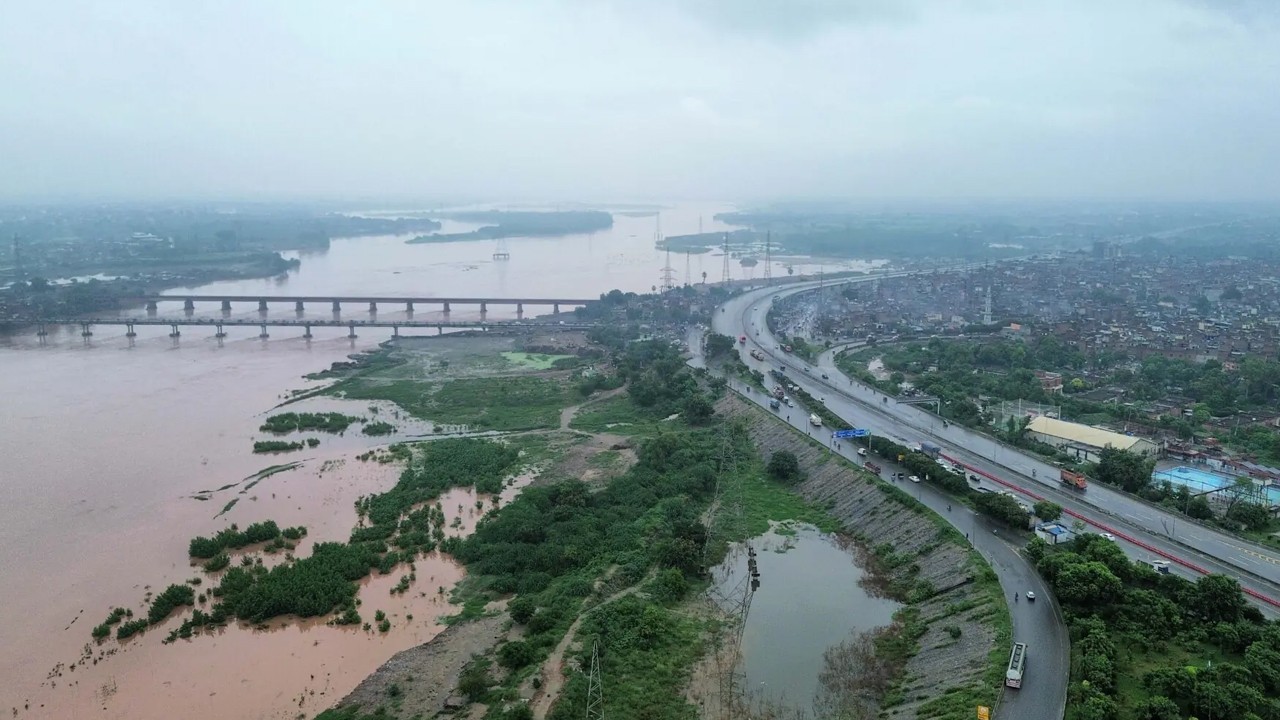
The dam break in India has diverted large volumes of water towards Kasur.
The release of water from India has triggered unusual flooding in Punjab’s major rivers, forcing thousands of residents to leave their homes.
The Sutlej River remains in high flood at Ganda Singh Wala, where authorities have issued evacuation orders for villages near the Talwar Post.
According to the Flood Forecasting Division Lahore, water flow at the site has fallen from 390,000 cusecs to 303,828 cusecs, but flood threats persist at Head Sulemanki and Head Islam.
Meanwhile, the Ravi River is witnessing a steady rise at Head Baloki, where inflows have reached 192,545 cusecs. Water levels are also climbing at Head Sudhanai, while a decline has been reported at Shahdara, Lahore and Jasar. In the Chenab River, inflows at Head Panjnad are also increasing.
Punjab must clear river pathways to prevent flood disasters: DG PDMA
Punjab PDMA Director General Irfan Ali Kathia said the dam break in India has diverted large volumes of water towards Kasur, bringing the Sutlej River to its highest level since 1955. “The biggest challenge at the moment is to protect Kasur city,” he said.
He added that Lahore is now completely safe, but the next 24 to 48 hours will be critical for downstream districts, including Okara, Sahiwal, and Toba Tek Singh, due to rising waters in the Ravi.
According to PDMA, 28 people have lost their lives in the floods across Punjab so far. However, timely rescue operations have helped prevent further casualties.
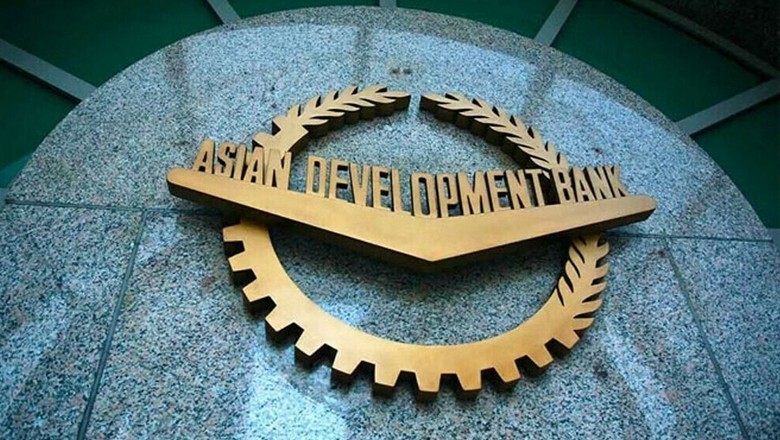
On Wednesday, the Bill & Melinda Gates Foundation committed $1 million in assistance for flood victims.
The Asian Development Bank (ADB) has announced a $3 billion emergency grant to support Pakistan in dealing with the devastating floods that have displaced millions and caused widespread destruction across the country.
According to details released on Friday, ADB President Masatsugu Asakawa approved the package, describing it as a vital lifeline for Pakistan during one of its most challenging humanitarian crises in recent history.
This major relief measure follows international aid pledges made earlier this week.
On Wednesday, the Bill & Melinda Gates Foundation committed $1 million in assistance for flood victims.
The support will be channeled through the World Health Organization (WHO), which will use the funds to provide medical aid for nearly 465,000 people in 33 flood-affected districts across all four provinces.
Read more: Park View City: From development to flooding and controversies
WHO’s Pakistan representative Dr. Daping Luo expressed gratitude for the timely contribution and reaffirmed WHO’s commitment to safeguarding lives.
He warned that intensifying climate change-driven monsoon rains had dramatically increased the frequency and severity of natural disasters in Pakistan.
Among all provinces, Khyber Pakhtunkhwa has suffered the most widespread damage.
The $3 billion ADB package, combined with other international relief efforts, is expected to play a crucial role in providing immediate humanitarian support and rebuilding critical infrastructure in flood-ravaged regions.
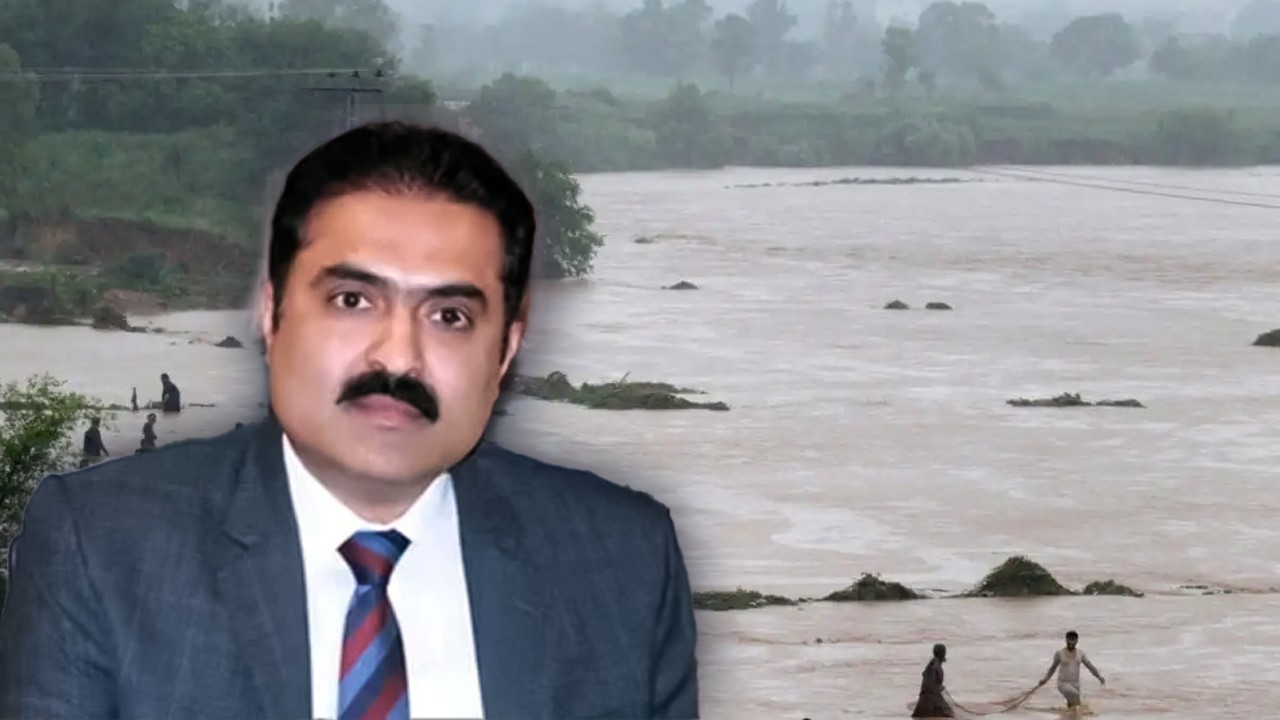
Punjab ks facing major flooding issue.
LAHORE: Director General of the Punjab Provincial Disaster Management Authority (PDMA), Irfan Ali Kathia, has stressed that river pathways must be cleared to avoid recurring flood disasters.
“If these passages are not vacated, the same tragedies will continue,” he warned.
Speaking to the media in Lahore, Kathia said that Chief Minister Maryam Nawaz had directed authorities to ensure the safety of both people and their livestock. “So far, 317,400 animals have been shifted to safer locations, with arrangements also being made for fodder,” he confirmed.
The DG reported that 20 people have lost their lives in flood-related incidents, with Gujranwala recording the highest number of fatalities.
He added that the Punjab government will provide Rs10 million in compensation to the families of those killed.
Kathia said that heavy rains are still expected in Faisalabad, Sargodha division, Rajanpur, and Dera Ghazi Khan, while urban flooding remains a threat until September 2.
Read more: Floods displace over 1.4 million people in Punjab, meteorologists predict more downpour
He assured that the administration has been placed on high alert and contingency plans have been directed.
Highlighting economic losses, the DG said crops have been badly damaged and a coordinated survey is being initiated to assess losses and provide relief to affected farmers.
He stressed that climate change is a reality and any development projects undertaken without considering it will result in setbacks. “We must clear water pathways; otherwise, the damage will keep repeating itself. The chief minister has given clear orders to vacate them immediately,” he said.
Kathia also pointed out that River Ravi had not seen such high levels of water for 40 years.
“People had been cultivating crops on riverbeds, but both the Ravi and Sutlej waterways have now been inundated. Lahore has just witnessed the largest flood discharge in Ravi since 1988,” he added.
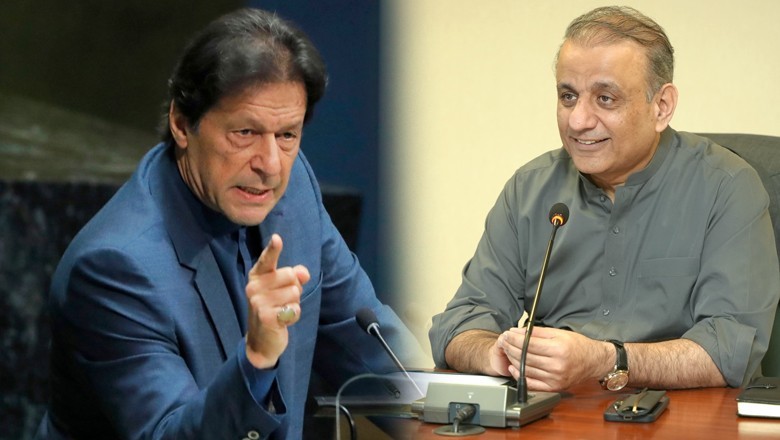
Khan said he denied the legalization of the land.
What Imran Khan said about Park View City !#FloodAlert #RaviRiver #AleemKhan #Lahore #قومی_لیڈر_بےگناہ_بےقصور@TeamiPians pic.twitter.com/iCPQbq5iAB
— Ahmed Mughal ⁱᴾⁱᵃⁿ🇵🇰 (@AhmedZubie) August 28, 2025
An old interview of former prime minister and PTI founder Imran Khan has resurfaced online, in which he discussed denying land allotment to Aleem Khan for Park View City.
The video clip, now circulating widely after severe flooding in Park View City — a housing society owned by current federal minister Aleem Khan — shows Imran alleging that Aleem Khan acquired 300 kanals of land in the Ravi River belt illegally.
“He was trying to legalize the land, just like the Sharifs did while in power, but I refused,” Imran Khan said in the interview.
The resurfacing of the clip has reignited debate about land regularization and housing projects in flood-prone areas, as Punjab reels from some of the worst flooding in recent years.
Read more: Ravi River surge floods housing societies in Lahore
Continuous rains and the release of water from India have kept the Chenab, Sutlej, and Ravi rivers in high flood, with water levels still rising. Several areas of Lahore have been inundated, forcing emergency evacuations.
In Shahdara, housing societies along the Ravi River were submerged, prompting residents to leave their homes.
Videos circulating on social media showed police making announcements for evacuation, while rescue teams assisted families in moving to safer locations.
Floodwaters at Shahdara have reached a dangerous level, submerging Farrukhabad, Aziz Colony, Amin Park, Afghan Colony, Shafiqabad, and Maridwala. Water has also entered Badami Bagh and spread into several areas of Chohang.

Malik dashed to his neighbor's home, guiding women and children to safety.
A 57-year-old shepherd in Shangla has been hailed as a hero after risking his life to rescue eight members of a neighbouring family and their livestock during the recent flash floods in Puran tehsil.
Shangla was among the districts worst hit by recent floods triggered by a cloudburst, with at least 36 lives lost. Dozens of houses were swept away in Puran tehsil.
On the night of August 14, Sher Malik was at home when he heard desperate cries for help. Floodwaters had surrounded his neighbours’ house, trapping children, women, and cattle inside.
Malik dashed to his neighbour's home, guiding women and children to safety. After ensuring their well-being, he went back for the family's livestock.
But as he tried to pull out a goat, the house’s tin roof suddenly collapsed on him. His arm was badly crushed, leaving him pinned under the rubble for nearly three hours as floodwaters raged around him.
Read more: PM Shehbaz honours GB shepherds who saved hundreds from GLOF disaster
He remained conscious despite his arm bleeding profusely. Malik's family sought help through mosque loudspeakers, and locals quickly came to his aid and pulled him out.
Malik was rushed to Peshawar for treatment, where doctors had to amputate his hand. Despite the life-changing injury, he says he has no regrets.
As a Muslim, a human, and a neighbour, he felt it was his duty to protect them.
Malik’s villagers visited him, praised his bravery and urged the government to provide financial assistance.
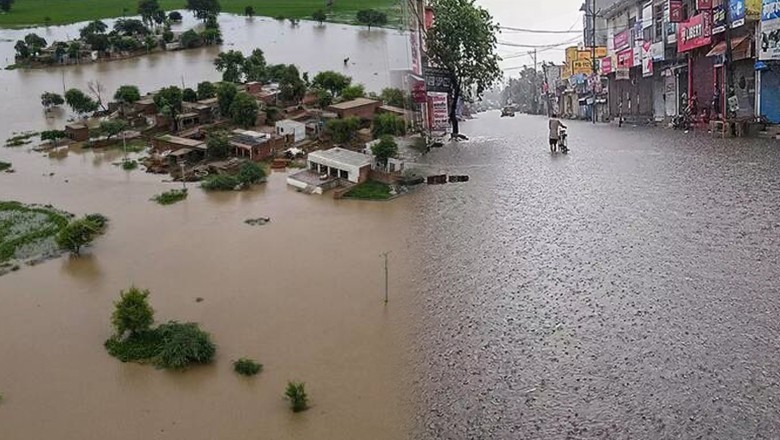
Strong monsoon winds from the Arabian Sea and the Bay of Bengal, coupled with a westerly system, are likely to bring very heavy rainfall to many regions.
The Punjab government has initiated one of the largest evacuation operations in recent years, with more than 1.46 million people affected by widespread flooding across the province. Officials have raised alarms over the rising water levels in Ravi, Sutlej, and Chenab rivers.
So far, at least 17 people have lost their lives as rivers continue to overflow. Authorities describe the current floods as the most severe in four decades, with hundreds of villages devastated and vast areas of standing crops submerged.
At Qadirabad, the Chenab’s water flow has been recorded at over 305,000 cusecs.
The surge has forced officials to breach embankments in several areas to divert water and reduce pressure. More than 1,400 villages remain under water, and forecasts warn that up to 800,000 cusecs could pass through the Chenab within the next 48 hours.
Millions of people have been dispaced in multiple districts, including Jhang, Shorkot, Khanewal, Multan, Muzaffargarh, Shujaabad, Jalalpur Peerwala, and Alipur, where thousands of families relocated to safer ground.
Meanwhile, fresh weather disturbances are expected to intensify the crisis.
The Pakistan Meteorological Department has forecast another spell of heavy monsoon rains beginning August 29 and lasting through September 2.
Read more: Punjab deploys thermal drone tech to track flood victims
Strong monsoon winds from the Arabian Sea and the Bay of Bengal, coupled with a westerly system, are likely to bring very heavy rainfall to many regions.
The Met Office has warned of prolonged downpours in Azad Kashmir, Gilgit-Baltistan, and Khyber Pakhtunkhwa districts.
Southern Punjab districts such as Multan, Bahawalpur, Rajanpur, and Rahim Yar Khan, as well as parts of Sindh and Balochistan, are also likely to experience heavy rainfall.
Authorities caution that flash floods, landslides, and urban flooding remain a serious risk in mountainous and low-lying areas. Relief agencies have been placed on high alert as rescue and evacuation efforts continue.
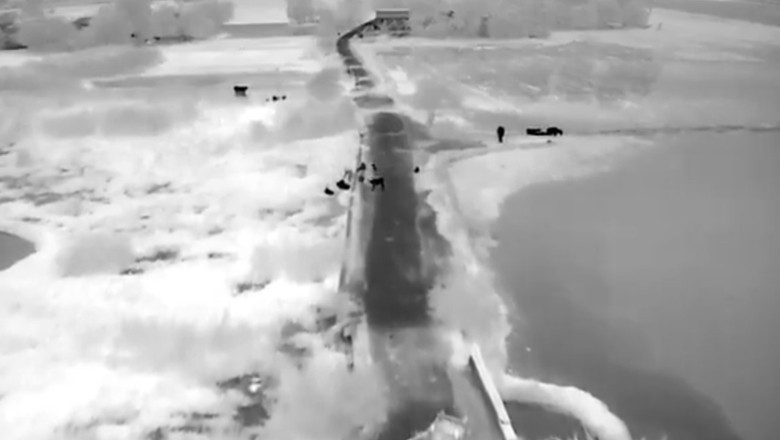
Flooding has turned entire towns and villages into rivers, sweeping away homes and cutting off roads.
Since most of the Punjab is now CCTV monitored, thermal imaging drone technology was used to spot & track stranded citizens and livestock in many districts including Sialkot, Sargodha, Gujrat & Jhang. 800 cases were successfully coordinated. Well done Safe City Authority. pic.twitter.com/K682qo7ofR
— Maryam Nawaz Sharif (@MaryamNSharif) August 28, 2025
Punjab Chief Minister Maryam Nawaz said the provincial administration is using thermal imaging drone technology to monitor flood-hit areas and locate residents and livestock trapped in rising waters.
In a post on X, she shared a clip from a thermal drone feed, showing people and animals stranded as the Ravi, Sutlej, and Chenab rivers continue to swell, inundating towns and villages across Punjab.
“Since most of Punjab is now under CCTV coverage, thermal imaging drone technology was deployed to spot and track stranded citizens and livestock in multiple districts, including Sialkot, Sargodha, Gujrat, and Jhang,” she wrote.
According to the chief minister, the Safe City Authority successfully coordinated over 800 rescue cases, helping emergency teams swiftly reach marooned residents.
Flooding has turned entire towns and villages into rivers, sweeping away homes and cutting off roads. In some places, people have taken shelter on rooftops of submerged houses, while others wade through waist-deep waters carrying their last belongings.
Also Check: Ravi River surge floods housing societies in Lahore
Widespread flooding has engulfed areas including Wazirabad, Kasur, Narowal, Hafizabad, Kamalia, Mandi Bahauddin, Bahawalnagar, Sialkot, Sargodha, Vehari, and Pakpattan. Temporary embankments have collapsed in several locations, further worsening the situation.
In Faisalabad’s Tandlianwala, rising water in the Ravi has forced authorities to evacuate residents from low-lying areas. The district administration and emergency services remain on high alert.
Meanwhile, water levels in the Chenab continue to climb, with the flow at Chiniot Bridge recorded at 830,100 cusecs. The Ravi has also reached dangerously high levels at Shahdara, submerging Farrukhabad, Aziz Colony, Amin Park, Afghan Colony, Shafiqabad, and Maridwala.

Ravi River's water inflow at Shahdara was reported 219,770 cusecs.
Continuous rains and the release of water from India have kept the Chenab, Sutlej, and Ravi rivers in high flood, with water levels still rising. Several areas of Lahore have been inundated, forcing emergency evacuations.
In Shahdara, housing societies along the Ravi River were submerged, prompting residents to leave their homes. Videos circulating on social media showed police making announcements for evacuation, while rescue teams assisted families in moving to safer locations.
Floodwaters at Shahdara have reached a dangerous level, submerging Farrukhabad, Aziz Colony, Amin Park, Afghan Colony, Shafiqabad, and Maridwala. Water has also entered Badami Bagh and spread into several areas of Chohang.
DIG Operations Faisal Kamran said that police and rescue officials are working to secure affected localities.
Meanwhile, floodwaters have destroyed crops across multiple districts, including Multan, Muzaffargarh, Vehari, Chiniot, and Faisalabad. Large swathes of agricultural land remain under water, leaving thousands displaced as villages and settlements are submerged.
Read more: Turkiye offers full support to Pakistan in flood situation
According to the Flood Forecasting Division, Ravi River's water inflow at Shahdara was reported 219,770 cusecs.
In the Chenab, water flow at Chiniot Bridge has risen to 85,300 cusecs, while Khanki has recorded 355,436 cusecs. The Trimmu Headworks is also witnessing a sharp rise.
Similarly, the Sutlej River at Ganda Singh Wala has swelled to over 261,000 cusecs, with authorities rushing to relocate residents to safety.
In Multan, authorities have warned that the Chenab’s floodwaters could enter city limits within the next 24 to 48 hours. To protect urban areas, a breach at Head Muhammad Wala has been planned.
Authorities have also decided to breach the Sher Shah and Head Muhammad Wala dams as precautionary measures to mitigate further disaster.
Thousands of families living along the banks of the Ravi, Sutlej, and Chenab rivers remain at the mercy of the floods, as land, homes, crops, and livelihoods, sink beneath the rising waters.
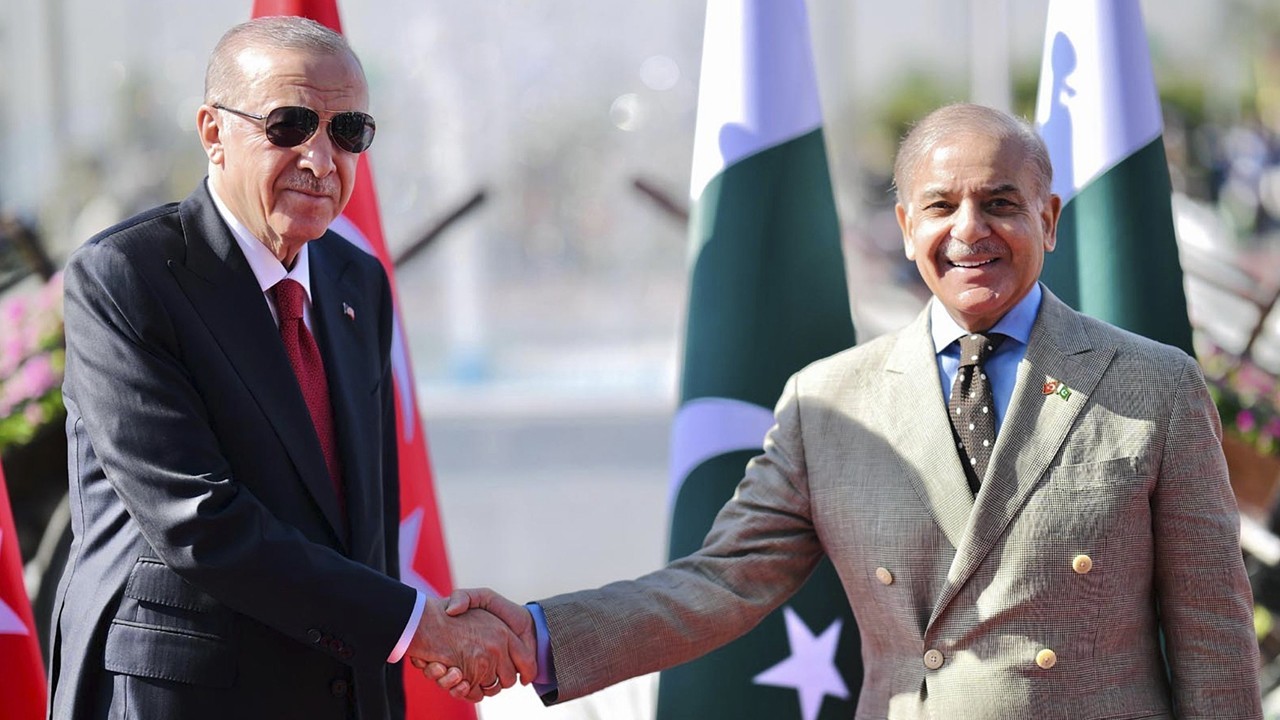
PM Sharif thanked his Turkish counterpart for extending support.
Prime Minister Shehbaz Sharif on Thursday received a telephone call from President Recep Tayyip Erdogan of Turkiye, who expressed condolences and solidarity with Pakistan over the devastation caused by recent floods across various parts of the country.
President Erdogan conveyed his heartfelt sympathies on the loss of precious lives and property, assuring that Türkiye stood ready to extend all possible assistance, including support in rescue and relief operations.
Thanking the Turkish President for his thoughtful sentiments and generous offer of help, Prime Minister Shehbaz Sharif said the call reflected the strong and time-tested brotherly ties between Pakistan and Türkiye.
Read more: Sindh Minister Sharjeel Memon extends support to flood-hit Punjab
He noted that both nations had always stood by each other during challenging times.
The two leaders also recalled their recent interactions earlier this year and expressed the hope of meeting again soon on the sidelines of the upcoming SCO Summit in Tianjin, China.
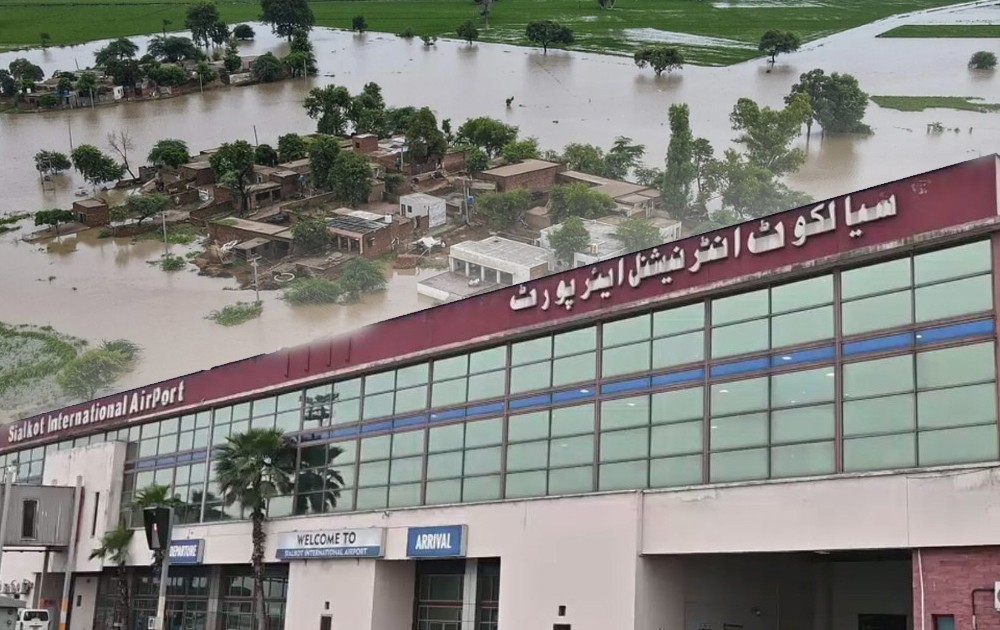
Floods have killed 12 people across the province
Flight operations at Sialkot International Airport Limited (SIAL) were suspended on Thursday from 10am to 10pm due to floodwater entering the southern part of the facility.
According to a Rescue 1122 spokesperson, a Notice to Airmen (NOTAM) was issued regarding the suspension, with operations halted until water is fully drained. Floodwater reportedly crossed the protective embankment, moving towards the airport from the southern side.
The spokesperson said all manpower and machinery of the SIAL administration had been mobilised to manage the situation. Additional dewatering pumps and other equipment are being used to clear the water.
Despite the inflow, the central portion of the airport, including the terminal building, parking area, and runway, remains unaffected. Officials confirmed that all equipment at the facility is safe.
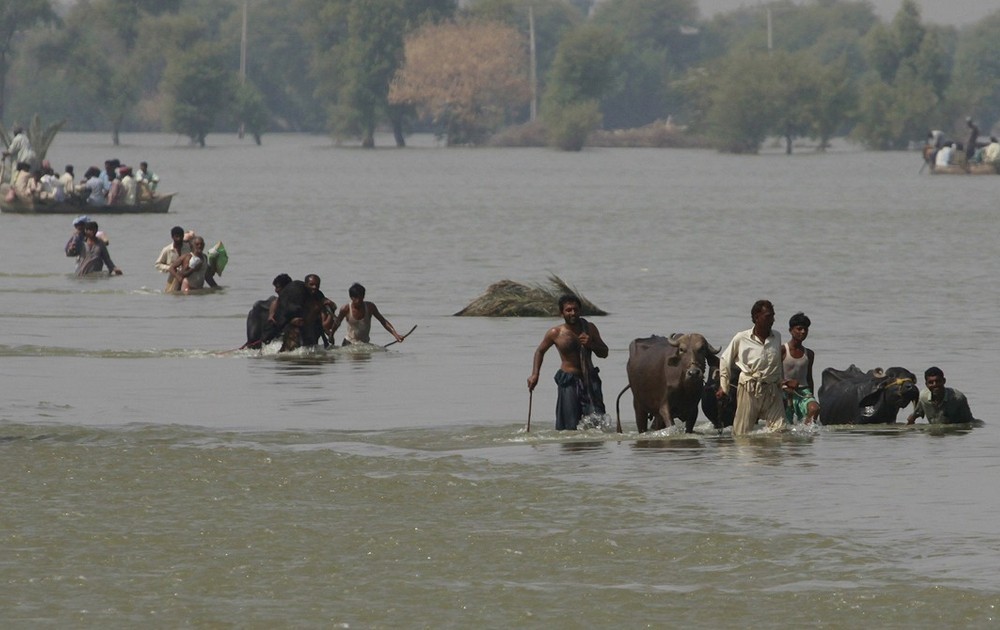
'The province must prepare for a high or very high flood. If the water volume is slightly less, that’s fortunate'
Ehsan Leghari, Sindh's member at the Indus River System Authority (IRSA), has cautioned that the province should prepare for flood flows of up to 800,000 cusecs in the coming days.
In his analysis shared on Facebook, Leghari said that the peak flows of the Chenab and Ravi rivers will converge at Panjnad around the same time or with a few hours’ difference, reaching their maximum flow of 650,000 to 700,000 cusecs by September 2.
"The Sutlej’s peak flow from Ganda Sawala will reach Panjnad a day later, on September 3," he said, adding that after traveling from Panjnad to Guddu, around 500,000 to 550,000 cusecs of water will reach Guddu by September 4.
"As mentioned earlier, Guddu receives water from two sources: downstream of Taunsa and downstream of Panjnad. If rainfall occurs in the Sulaiman range, additional water from hill torrents will flow through these to Guddu," Leghari explained.
Also Read: Ravi, Chenab, Sutlej overflow as 500 families evacuated, 11 reported dead
"Currently (August 28), the flow downstream of Taunsa is around 250,000 cusecs, while over 330,000 cusecs are flowing at Guddu. In the coming days, the Indus’s own flows are expected to remain between 300,000 and 350,000 cusecs."
He said that when the Panjnad water arriving on September 4 is added, the total flow at Guddu will reach approximately 750,000 cusecs, adding that since the Chenab’s flows have already decreased at Marala, this peak of 700,000 to 750,000 cusecs may last for one or two days.
"Therefore, Sindh must prepare for a high or very high flood. If the water volume is slightly less, that’s fortunate. To reiterate, whether the water reaches 600,000 or 700,000 cusecs, preparations should be made for 800,000 cusecs," he cautioned.

Relief activities are underway across Punjab.
A severe flood situation has developed in Punjab as water levels continue to rise in major rivers, particularly Ravi, Chenab, and Sutlej, submerging villages, damaging standing crops, and breaching protective embankments.
At Shahdara and Jastar points in Lahore, the Ravi River has reached extremely high flood levels, with authorities declaring the next 12 hours critical.
According to the Provincial Disaster Management Authority (PDMA), water flow at Shahdara has reached 180,000 cusecs, expected to surge to 200,000 cusecs.
Over 500 families have already been relocated to safer places, while evacuation from some low-lying settlements is still underway.
Meanwhile, at Head Qadirabad on the Chenab River, water flow has swelled to nearly 996,000 cusecs, exceeding the barrage’s capacity of 800,000 cusecs by almost 200,000 cusecs.
Read more: 'Ravi will soon become sewerage drain': Imran's old clip resurfaces online
PDMA Director General Irfan Ali Kathia warned that pressure on the left embankment poses a serious risk of breach, which could endanger Hafizabad and Chiniot districts.
Explosives have been placed at certain embankments in Chiniot for a possible controlled breach to prevent larger devastation.
Local administrations, irrigation staff, and rescue teams remain on high alert, with sirens sounded to warn nearby residents. Despite these measures, 11 deaths have been reported so far from roof collapses and drowning incidents.
The Ravi River has also surged near Head Balloki, while in Shakargarh’s Bhiku Chak area, a protective dyke collapsed, submerging several villages.
Rescue teams are continuously monitoring the situation, and disaster cells have been activated to strengthen embankments and coordinate evacuation efforts.

The floods have already caused devastation in Punjab, leaving seven people dead and three missing in the Gujranwala division.
A high-level flood was reported at Shahdara after water flow in the Ravi River surged to over 145,160 cusecs. Commissioner Lahore warned that the discharge could rise further, reaching up to 160,000 cusecs today. The river has a maximum capacity of up to 200,000 cusecs.
He added that while the flood situation in the Ravi remains under control, all departments, including the district administration, are on high alert.
At the Jasar point on the Ravi, the water pressure has begun to ease slightly, with the flow dropping to 152,000 cusecs.
Meanwhile, the Chenab River is also witnessing fluctuations. At Head Khanki, the discharge has fallen from 1.5 million cusecs to 905,000 cusecs, while at Head Qadirabad, the flow has swelled to 1,045,601 cusecs, maintaining an unusual flood situation.
The Sutlej River is also under strain. At Ganda Singh Wala, the water flow has crossed 261,000 cusecs, while Head Marala is witnessing 240,000 cusecs of high-level flooding. Medium-level floods are being reported at Balloki Headworks on the Ravi and Sulaimanki on the Sutlej.
Read more: Gates Foundation pledges $1 million aid for Pakistan’s flood victims
The floods have already caused devastation in Punjab, leaving seven people dead and three missing in the Gujranwala division.
The National Disaster Management Authority (NDMA) on Tuesday warned that strong monsoon winds from the Bay of Bengal and the Arabian Sea entered the upper and central regions of the country, bringing the risk of further heavy rainfall.
According to an NDMA statement, the monsoon system is likely to persist until Friday, producing moderate to heavy rains in the Ravi watershed.
Narowal, Shahdara, and the northern outskirts of Lahore are expected to be particularly vulnerable to severe flooding. The NDMA further warned that these rains may heighten the risk of urban flooding and landslides.
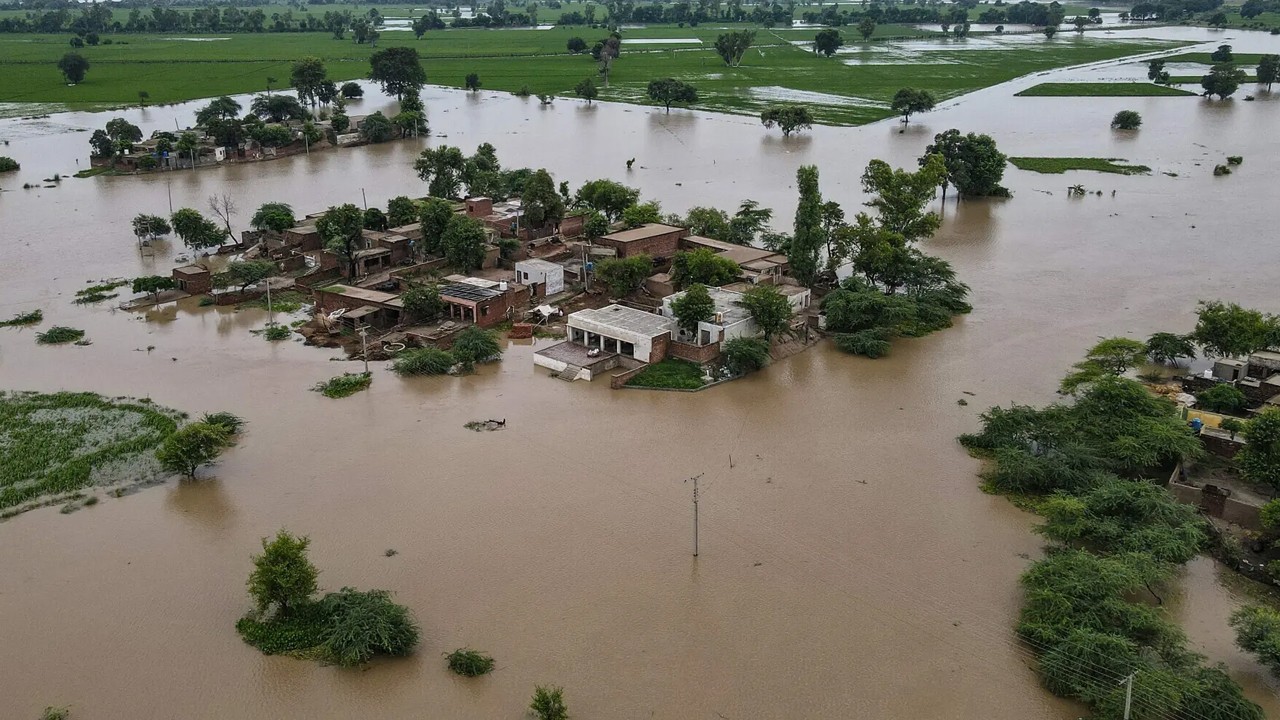
Pakistan is again facing massive floods.
Pakistan is once again gripped by catastrophic monsoon floods, with the death toll climbing past 800 since late June — half of them in August alone.
Authorities have issued urgent warnings of a “high flood” in the River Ravi at Shahdara on Wednesday night, as Punjab faces an “exceptionally high” risk due to heavy rains and excess water India has released from dams in Indian Illegally Occupied Jammu and Kashmir (IIOJK).
Officials said all major dam gates in the region have been opened, creating a dangerous downstream flow. More than 167,000 people in Punjab have already been displaced, including nearly 40,000 who evacuated voluntarily after early warnings on August 14.
Entire villages have been swept away in the north, while Karachi — Pakistan’s largest city — has once again been paralysed in the south.
Experts and residents alike blame not only extreme weather but also decades of poor governance and mismanagement.
Climate scientists say global warming is amplifying monsoons, with rising temperatures allowing the atmosphere to hold more moisture, leading to heavier downpours over short periods.
In Buner, Khyber Pakhtunkhwa, more than 150mm of rain fell within an hour, unleashing flash floods and landslides that flattened hillside homes.
The Pakistan Meteorological Department has warned that monsoons will grow more intense in the coming decades, while glacier melt in the north continues to increase the risk of glacial lake outburst floods (GLOFs).
Earlier this month, the Shisper Glacier burst into the Hassanabad nullah in Hunza, destroying farmland and infrastructure.
Although Pakistan contributes less than 1% of global greenhouse gas emissions, it ranks among the countries most vulnerable to climate change.
“Pakistan is paying a big price for international sins,” a provincial lawmaker told the BBC. Former climate minister Sherry Rehman added that global support has been slow, even as Pakistan faces repeated climate disasters.
This year’s floods have been intensified by cloudbursts — sudden, localised downpours that overwhelm rivers and soil, triggering deadly flash floods and mudslides. Emergency teams, hampered by cut-off roads, struggled to reach stricken villages.
But human negligence has worsened the disaster. Despite laws like the River Protection Act, residential colonies continue to be built along riverbeds, blocking storm drains.
In Swat, families who lost homes in 2010 and again in 2022 saw them swept away once more this year.
Deforestation, unchecked logging, and mining have stripped natural defences. With forest cover down to just 5% — the lowest in South Asia — slopes once protected by dense woodland now funnel torrents straight into valleys.
Urban planning failures have also left megacities exposed. Karachi’s stormwater drains, clogged with more than 20,000 tonnes of daily solid waste, overflow during rains, turning streets into rivers. Illegal construction and sewage dumping further choke the system.
A Human Rights Commission of Pakistan (HRCP) report said Karachi’s flooding is “as much about clogged drains, poor waste disposal, encroachments and elitist housing societies as about rainfall itself.”

The assistance will primarily focus on providing emergency healthcare services to the affected population.
The Bill & Melinda Gates Foundation has announced $1 million in humanitarian assistance for flood-affected communities in Pakistan.
According to details, the aid will be channeled through the World Health Organization (WHO) to support 465,000 people across 33 districts in all four provinces.
The assistance will primarily focus on providing emergency healthcare services to the affected population.
WHO Representative in Pakistan, Dr. Dapeng Luo, expressed gratitude to the Gates Foundation for the timely support, stressing that the aid will play a crucial role in saving lives and ensuring essential health coverage for vulnerable communities.
Read more: UN announces $600K emergency aid for flood-hit Pakistan
During his visit to flood-hit regions, Dr. Luo highlighted that climate change has intensified the monsoon season, accelerating the frequency of natural disasters.
He asserted that better preparedness and rapid response mechanisms are critical to safeguarding public health.
WHO further reported that between June 26 and August 27, Pakistan has recorded 802 deaths, 1,088 injuries, and the loss of 5,584 livestock due to flooding. Since June, WHO has already provided

The large-scale evacuation was made possible through joint efforts of the Pakistan Army, Rangers, Rescue 1122, Provincial Disaster Management Authorities (PDMAs) and other agencies
National Disaster Management Authority (NDMA) Chairman Lt Gen Inam Haider Malik said on Wednesday that around 210,000 people have been safely evacuated from flood-hit areas, with no loss of life reported so far.
Briefing the media, Lt Gen Malik said the large-scale evacuation was made possible through joint efforts of the Pakistan Army, Rangers, Rescue 1122, Provincial Disaster Management Authorities (PDMAs) and other agencies. Those displaced have been shifted to relief camps where they are being provided with food, medical assistance and other essentials, he added.
The NDMA chief said that the authority has issued fresh early warnings for another spell of monsoon rains forecast between August 29 and September 9, mainly in catchment zones of already inundated areas. Local administrations, non-governmental organisations and other stakeholders have been instructed to remain on alert to reduce potential losses, he highlighted.
Also Read: PMD sees ‘very high’ flood at Sindh’s Guddu, Sukkur barrages on Sept 4-5
He said that water flow at Panjnad is expected to increase to 600,000–700,000 cusecs in the coming days. He said the NDMA is sharing real-time alerts with the Sindh PDMA and other relevant authorities to ensure timely preparations, while pressure points at downstream barrages, including Kotri and Guddu, are under constant watch.
He added that evacuations are continuing in low-lying areas along the Sutlej River as water levels rise. Army formations are carrying out rescue operations in their designated sectors on the directives of the Chief of Army Staff, with priority given to vulnerable communities.
The NDMA chief further warned of additional rainfall in Azad Jammu and Kashmir and Khyber Pakhtunkhwa. He urged citizens to stay updated through the NDMA Disaster Alert mobile app.
He said that advisories have already been issued for the next 25 to 45 days, particularly for northern Punjab, AJK and Gilgit-Baltistan, as heavy rains could trigger more flooding in these regions.

Sutlej and Ravi may face high flood levels
The Flood Forecasting Division (FFD) has issued a warning of heavy rainfall and potential high-level flooding in major rivers across Pakistan starting from August 31.
According to the FFD, rainfall is expected in the upper catchment areas of the country’s major rivers from August 29, with the intensity likely to increase by the end of the month.
The division has cautioned that the Sutlej and Ravi rivers may experience high to very high flood levels, while seasonal streams and tributaries of the Ravi and Chenab could witness above-normal flooding within the next 24 hours.
The forecast further indicates that the Chenab River at Head Trimmu could reach very high flood levels by the evening of August 29. At Panjnad, a high flood situation is anticipated around September 2. Meanwhile, the Indus River at Guddu and Sukkur barrages is expected to face high flood levels between September 4 and 5.
Authorities have been urged to remain alert and take precautionary measures in vulnerable areas, particularly in Punjab and Sindh, where riverine and urban flooding risks remain elevated.
The warning comes as parts of Punjab are already grappling with flooding, and water levels in several rivers continue to rise due to ongoing heavy rainfall across the region.

According to Khawaja Asif, India had twice informed Pakistan before releasing water into the rivers.
Defence Minister Khawaja Asif revealed that the floodwater flowing from India into Pakistan also carried dead bodies. He warned that although the river flow has now moderated, the risk of another flood still persists.
He stated that dead bodies, livestock, and heaps of trash in floodwater further complicated drainage operations for municipal authorities.
According to Khawaja Asif, India had twice informed Pakistan before releasing water into the rivers.
Speaking about the unusual scene of bodies floating in floodwater, Asif said locals reported witnessing corpses swept across the border.
The minister added that this year’s torrential rains broke decades-long record, noting that a similar situation was last witnessed in 1976.
Read more: Sialkot receives heaviest one-day rainfall in nearly five decades
He stressed that authorities and locals failed to take timely precautions, including the removal of encroachments along natural water passages.
Speaking about his hometown Sialkot, Asif pointed out that at least three major nullahs remain clogged with filth, which authorities neglected to clean despite prior warnings.
He urged an urgent upgrade of the sewage system and criticised the failure of civic bodies to properly maintain drainage channels.
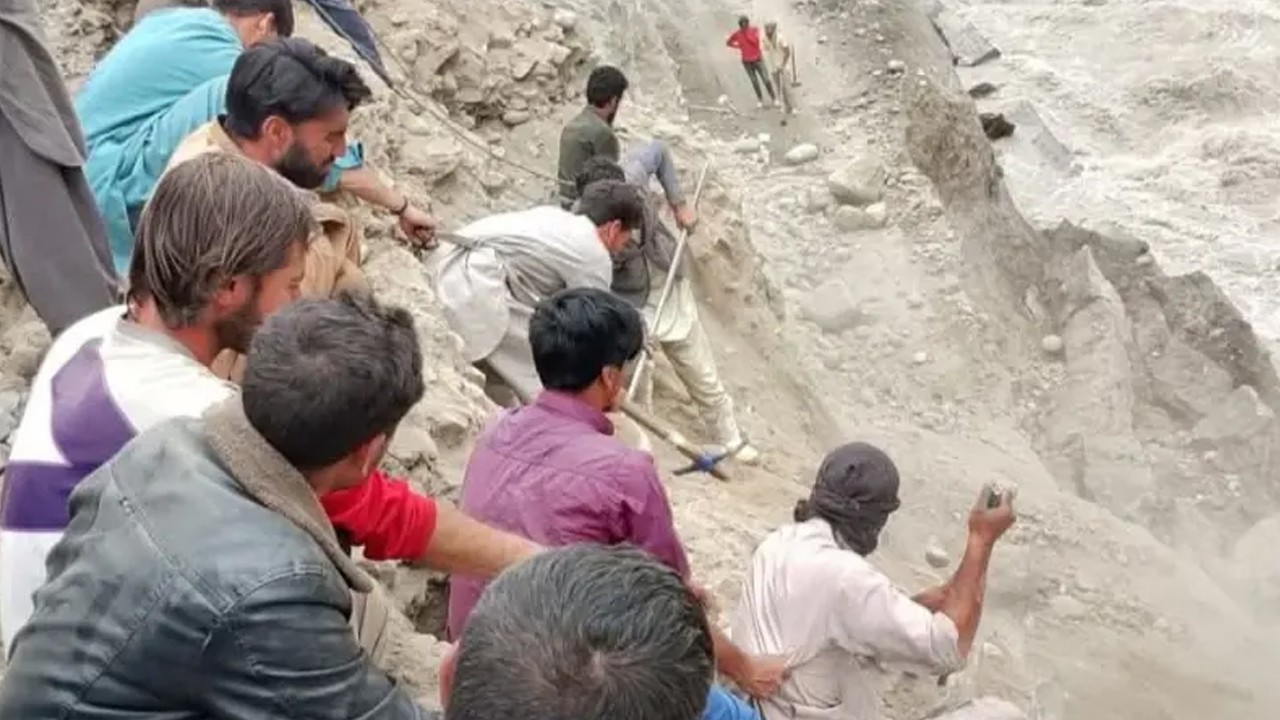
Most of Ghizer’s tehsils, including Gupis, Phander and Yasin, have been blocked after five kilometres of the Gilgit-Shandur road was submerged by an artificial lake
Large parts of Gilgit-Baltistan’s Ghizer district remained cut off for the fifth straight day on Tuesday after monsoon-triggered floods and landslides blocked key routes.
Residents said that most of Ghizer’s tehsils, including Gupis, Phander and Yasin, have been blocked after five kilometres of the Gilgit-Shandur road was submerged by an artificial lake that formed at Raushan village.
They said that around 300 houses were damaged as the lake inundated homes in Hakis, Thangi and Raushan.
The residents said that hundreds of people have been displaced when a glacial lake outburst flood swept through Tildas village, adding that survivors were without electricity, clean water, shelter and medical care.
Also Read: Local shepherd honoured for saving hundreds of people during flood disaster in Gilgit-Baltistan
On Monday, two critically ill patients were airlifted from Gupis to Gilgit by an Aga Khan Development Network helicopter, according to the Aga Khan Agency for Habitat.
Roads remain blocked in Khalti, Daen, Chatorkhand and Yasin. The Karakoram Highway at Hassanabad, Hunza, has been closed for three weeks after a GLOF from the Shishper glacier submerged part of the highway and destroyed homes and farmland.
In Nagar’s Hisper valley, residents have been isolated for a month after river erosion and landslides blocked the only road. Gilgit’s Haramosh and Bagrot valleys are also inaccessible due to flood damage.